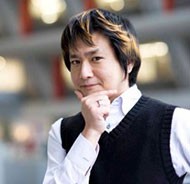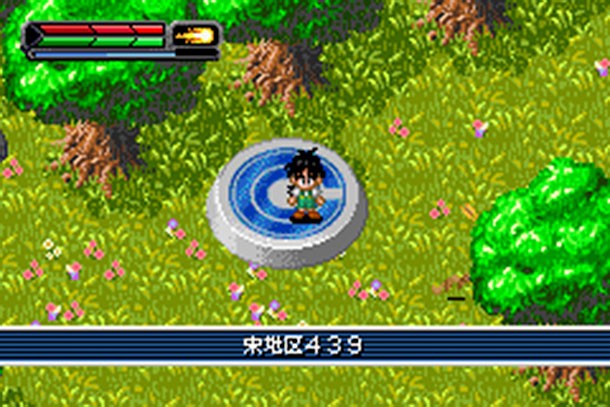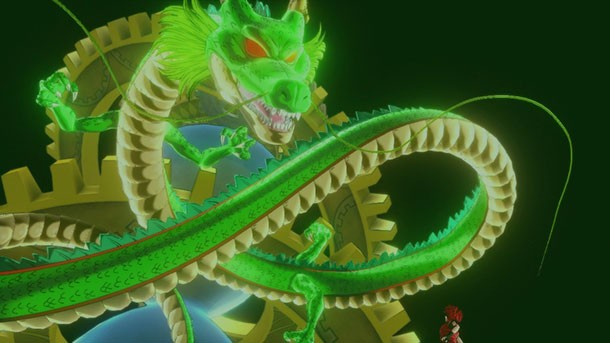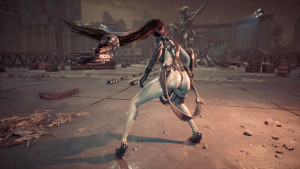Please support Game Informer. Print magazine subscriptions are less than $2 per issue
Dragon Ball Z: Budokai's Producer On Cutting Off After Three Entries And Working With Akira Toriyama

In the Dragon Ball FighterZ issue of the magazine you can find a separate feature about the history of the franchise and its myriad video game adaptations. As part of that look back, we were able to speak with Daisuke Uchiyama, who served as the producer on the three Budokai games, as well as a few other Dragon Ball games. Uchiyama spoke to us about how the Dragon Ball video games have evolved over the the last few years, what it was like to meet the creator of Dragon Ball, Akira Toriyama, and whether or not a future Dragon Ball game would explore a genre other than fighting.

Game Informer: What is your history with making Dragon Ball games? What was your first Dragon Ball game?
Daisuke Uchiyama: I first joined Bandai, and became a part of the Game Department – that was in 1994, so it was a long time ago. The game that I first worked on in the department, was actually Dragon Ball! At that time, I was working on the SNES’ Dragon Ball Z: Super Butōden 3 as the producer’s assistant – from creating the instruction manual, debugging; basically I did everything. Around the end of my freshmen year in the company, it was the time when the original PlayStation was about to be released and my senior manager told me, “You’ll be in charge of the next Dragon Ball game for PlayStation!” Come to think of it now, it was unthinkable to let a freshman work on a new platform [laughs] but I was fortunate enough to be given the opportunity. Thus, my first work as a main producer was for PS1’s Dragon Ball Z Ultimate Battle 22. So, basically, I’ve been doing projects surrounding the Dragon Ball franchise for almost my entire career.
How has the atmosphere of the studio changed since the earlier days of Dragon Ball games?
When it was my first time working on Dragon Ball projects, it was the time when the manga and the TV anime were still running on different media; so commercially it was marketed as an ordinary character game. However, as time went by, I realized that despite both the manga and the anime series having ended, Dragon Ball games continued to perform well and had gained popularity worldwide. Unlike in the past – when, as a producer, you would think like, “I alone can make that Dragon Ball game!”, now we have a new generation of Dragon Ball game fans. As a producer I feel that fans of past Dragon Ball games have also contributed to the development of the newer games. These things happen because of the timely relationship between the fans and the franchise – which are hard to find in other games. Not only for the fans, but we also have cases where developers reach us and say, “Let us make the next Dragon Ball Game!” From a perspective of a producer, I think I’m really flattered by how Dragon Ball games have impacted the industry and the lives of its fans.

Which game was the most difficult or stressful to make?
There are two games. The first one was PS2’s Dragon Ball Z Budokai. We planned for this game to be a nostalgic game. We were working with Dimps, which, at the time, was entering their first time developing a Dragon Ball game. We put so much time and effort to have the same vision about Dragon Ball and its capabilities (e.g., Goku’s strength/charm, etc.). Also, the supervision/licensing process was so difficult that one time we had to recreate an almost-finished model from scratch. Despite all of those difficulties, the results were unbelievable and I still can’t believe it to this day how much impact this game brought to people. It turned out to be not just a nostalgic game, but also a game where people can really utilize the powers of their beloved Dragon Ball characters. Plus, I was more surprised that it performed well outside of Japan, and since that pivotal point, I think this game has changed the perspective of how a game should be produced, and how business is conducted in the gaming industry in general.

The other one was PS3/Xbox360’s Dragon Ball Xenoverse. It was me and [Masayuki] Hirano-san (who served as the main producer) who came up with the idea, and it was a huge challenge to drift from the “recreation” elements of past Dragon Ball games, and create a whole new game style. Both of us thought that, “If we keep recreating stuff from the past, there will be no future for Dragon Ball games.” That’s why we decided to completely go on a new path. We had anticipated negative comments coming from Dragon Ball game fans from all over the world – we prepared for the worst. Throughout the course of Xenoverse’s development, Hirano-san was in charge of the general production of the game, and my part was to include the features of Dragon Ball Online to the Xenoverse world and explain the game concept to the licensor. This process took quite some time, but we finally got a green-light to proceed with the idea, exactly one year after we first pitched it. As a result, to see people enjoying Mira and Towa as the Supreme Kai of Time; and the whole Xenoverse experience is still one of the best feelings I have gotten from a project. On top of that, I’m proud to say that the Xenoverse game has stood out to be the best selling Dragon Ball game of all time – and it was all worth the time and effort.

What game are you the most proud of?
That will be the last Dragon Ball game that I produced by myself, PS2’s Dragon Ball Z Budokai 3. I have my own policy (for game series) which is the following: Create the first from scratch; Evolve the second; Complete the series by the third; Don’t make a fourth. With that policy, I put in my heart and soul to complete the Budokai series with improved game designs, art direction, shading, and volume; this all went into Budokai 3. The opening song of the game was recorded in Los Angeles – and I thought it was super cool! When I added the animation to that song, it got even more cool! Oh, and about the fourth point of my policy – Don’t make a fourth – the reason I have it like that is because if I make a fourth, then the series will never end at the end of the day along with the gameplay. That’s why I wanted to end the Budokai series with a bang with Budokai 3. At that time, I talked to my junior [Ryo] Mito-san, “Let’s make a new Dragon Ball game,” and that conversation turned into the Budokai Tenkaichi series – which performed really well too!
Dragon Ball Z Budokai was a landmark entry in the library of Dragon Ball games. Why did that game elevate the series as much as it did?
Hmm... I’m not really sure. What do you think? [Laughs] as I mentioned in my previous answers, this game was not supposed to be the game to “elevate Dragon Ball games” by any means. However, because we mainly focused on giving the best of both worlds: original story recreation and original scenarios; the game become more in-depth with the charms of Dragon Ball – and people loved it. And with that I’m very pleased [laughs].
For more from Uchiyama, including whether we will ever see more Dragon Ball RPG games, head to page two.

There are plenty of Dragon Ball fighting games. Would you ever consider a deeper exploration of the RPG genre?
Let’s see. If the current Dragon Ball producer came up to me with an RPG proposal, personally, I would give it a go. Since I’m not directly involved in the production of games anymore, I would leave the projects to the future generation of producers. From a fan perspective, I think it would be great to deliver a whole new experience for Dragon Ball game fans, so I hope such a project will happen in the future.
What would you like to see from the future of Dragon Ball games? How will the franchise stay relevant?
I think currently Dragon Ball games have reached its peak and occupies a different level in the character game retrospective. But, I hope future Dragon Ball games will further evolve the franchise’s status in the gaming world – making it a one of a kind game franchise. There’s nothing concrete as to what it is, but I’m sensing a hint from the following keyword: “Creating a Dragon Ball game with Everyone around the World – Online." There is no actual plan or proposal about this, though [laughs]. When the game evolves into a higher level, and people have fully understood the charm of Dragon Ball, then the game will just enter a long-term popularity cycle; and does that not make this game relevant by itself? The franchise is already popular within two generations – the parent and child generation, and we hope to have a new generation of fans coming in the future.

What is the strangest Dragon Ball game you worked on?
Obviously, Dragon Ball Xenoverse for me. The plan started with our aim to actually change the history within Dragon Ball, and it gets scary when you know everybody around the world will judge you. And it’s also strange because on this game you don’t play as Goku – which is really rare.
Which game was the most commercially successful?
That would be “Dragon Ball Xenoverse.” I think the game reached the 5 million landmark in sales, isn’t that amazing? Before that, Budokai 1 held the record for 3.5 million, and with that record being broken 10 years after, that clearly explains how amazing Dragon Ball is as a franchise! Amazing stuff.

What is like to work with Akira Toriyama?
Actually, I’ve only met him in person once, and he was extremely friendly and a really nice person to talk with. When I met him, I felt nothing but honored to be given the opportunity to be a part of the cultural movement that is Dragon Ball. I have the utmost respect for him, because when I was in elementary school, I often drew Dragon Ball stuff in my notebook. It felt like meeting your superhero in person. My personal favorite of Akira Toriyama’s drawings is Frieza’s final form. That one was crazy cool! With as little shading as it was, to have that impactful silhouette, truly shows the grace of Akira Toriyama.
Do you have any surprising development stories from your time making Dragon Ball games?
This was around the development of Budokai 1. As I mentioned, back in the day the licensor rejected our game as a whole and we had to stop the production. When that happened, the Dimps team and I worked through day and night to revise the game; even re-building the game from scratch. Eventually we managed to get through the licensor, and come think of it, it’s a really laughable topic when we talk about it today, but at that time I thought I was dead [laughs]. Imagine if I gave up on that situation, I think there won’t be any Dragon Ball games today – so I think it was good that I was that desperate to make things happen [laughs].
When did Dragon Ball become an international brand as opposed to a strictly Japanese brand? Did it change the approach to the games at all?
I think the popularity started to spread even more after the Budokai series. Before that, honestly speaking, I didn’t think that there were that many Dragon Ball fans at that time – let alone fans who owned a Dragon Ball game. Since the Budokai series, each and every Dragon Ball game proposal always aims for worldwide success and that has become an obvious thing. We’ve added our approach in developing the game, like getting feedback from the fans for instance. And since the Budokai series, the sales for Dragon Ball games have increased by 90 percent – and that’s happening outside of Japan.

Do you have any insight into why Dragon Ball: Shenron no Nazo for Famicom was so heavily localized for the American NES version?
Wait. Really [laughs]? Actually, when Dragon Ball: Shenron no Nazo came out, I was still waiting on the decision whether I would make it to junior high school or not. I’ll ask my senior when I have the chance. [laughs]
For more from our month of Dragon Ball coverage, including new details for FighterZ, click the banner below.











